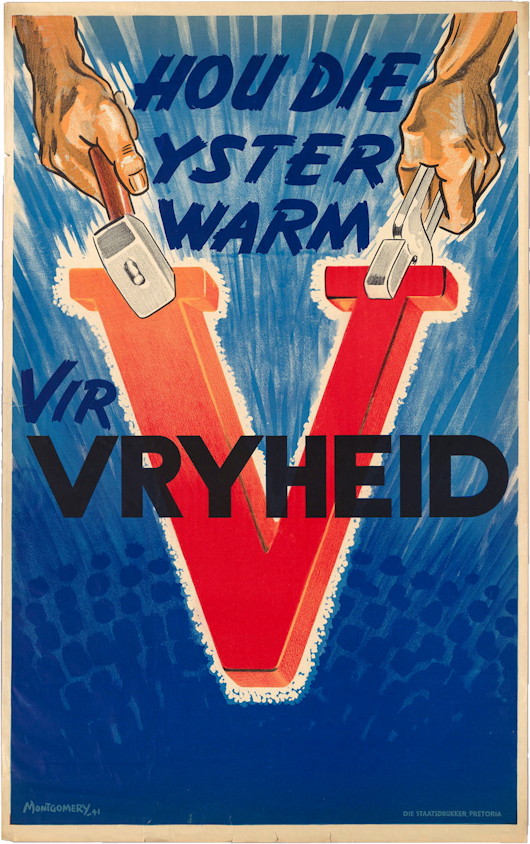
About Andrew Cusack
 Writer, web designer, etc.; born in New York; educated in Argentina, Scotland, and South Africa; now based in London.
Writer, web designer, etc.; born in New York; educated in Argentina, Scotland, and South Africa; now based in London. read more
News
Blogs
Reviews & Periodicals
Arts & Design
World
France
Mitteleuropa
Knickerbockers
Argentina
The Levant
Africa
Cape of Good Hope
Netherlands
Scandinavia
Québec
India
Muscovy
Germany
Academica

The twenty-second letter of the alphabet became a powerful symbol during the Second World War — ‘V’ for Victory, and all that. Even the Morse code for the letter — dot-dot-dot-dash — became useful, echoing as it did the famous four-note motif from Beethoven’s fifth symphony.
In South Africa, however, the two main languages were English and Afrikaans, and the Afrikaans word for victory, oorwinning, does not start with a ‘V’. Instead the letter was used to stand for vryheid, or freedom, just as in Belgium it stood for both victoire for the Walloons and vrijheid for the Flemings.
When the Second World War started Prime Minister Hertzog announced a policy of neutrality, only to be toppled as premier by his deputy and ally Smuts who brought South Africa into the war a few days later than Canada, Australia, and New Zealand.
This wartime propaganda poster, produced by the Staatsdrukker in Pretoria, urges South Africans to ‘keep the iron hot for freedom’. The country’s industrial production made a valuable contribution to the war effort in addition to the volunteer manpower of the Union Defence Force and, perhaps most importantly, the gold that came from the Witwatersrand mines.
Search
Instagram: @andcusack
Click here for my Instagram photos.Most Recent Posts
- Silver Jubilee November 21, 2024
- Articles of Note: 11 November 2024 November 11, 2024
- Why do you read? November 5, 2024
- India November 4, 2024
- The Lithe Efficiency of the Old Constitution November 4, 2024
Most Recent Comments
Book Wishlist
Monthly Archives
Categories



Ah, but Hertzog (or at least his natural successors) had their revenge in 1948.
The average Afrikaner had no reason either to love or defend the British Empire.
Cusack et al …
Hetterscheidt is, indeed correct … My Afrikaner “oumatjie” was a captive in a British “concentration camp” and did not have a warm relationship with my Englishman father. In the Fifties, I remember it was frequent to hear Afrikaner friends and family refer to the war with Germany as « Engeland se oorlog ». I saw the very phrase in a letter written to a friend during the period of the “Phoney War” when there was much discussion about supporting the Empire.
Avdb …
I’ve often thought it odd that amongst the subject white tribes of Empire, hatred of Britain trumped any sympathy you might assume they’d have for the plight of their former mother-countries, France and the Netherlands.
Alan,
I’ve never heard of similar sentiment in Quebec, to which I assume you’re referring. Were Duplessis and the Union Nationale ambivalent towards the war?
In 1942 a plebiscite was held on the question of conscription. Quebec voted 72.1% against. Every other province and territory voted yes. e.g. Ontario voted 84% in favor.